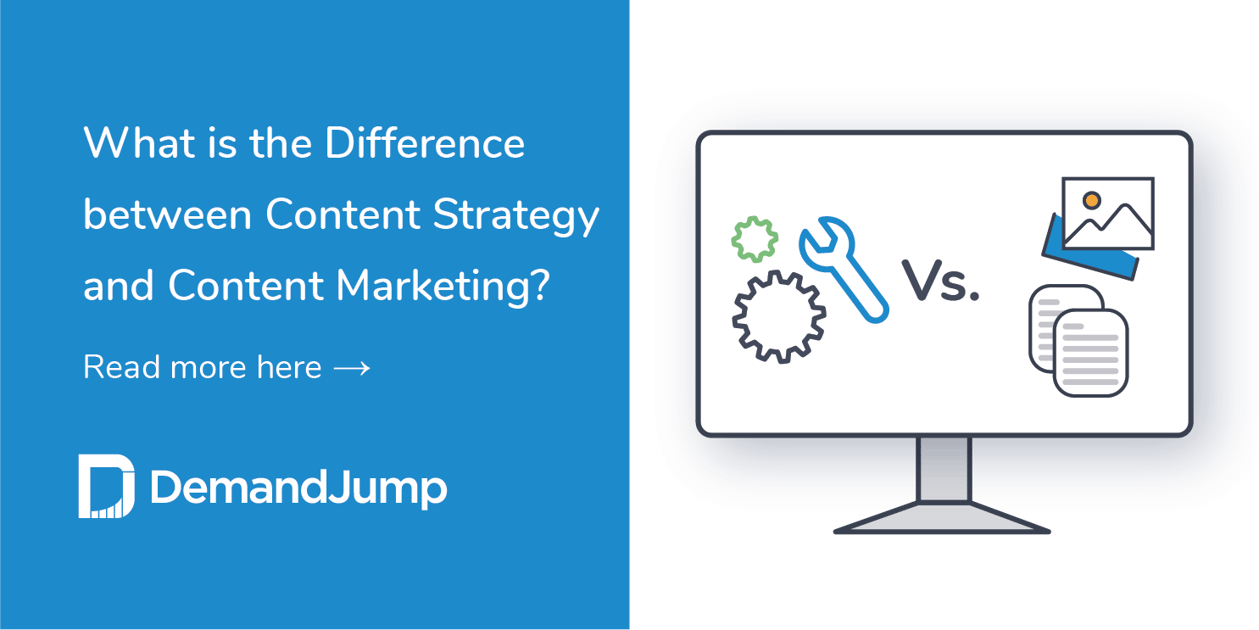December 7, 2020 •DJ Team

December 7, 2020 •DJ Team

Content Marketing isn’t a new buzzword, but the amount of attention it gets only grows. With modern marketers increasing their focus on digital marketing efforts, it’s easy to understand why. Digital content marketing works.
Never before have marketers been able to access in-depth datasets and ROI tracking like they can with content marketing initiatives. In the same light, there’s never been a better way for a brand to get their message to consumers right where they exist already.
If you’re here, you’re probably getting your feet wet with content marketing, and are looking to better understand the lingo, and what goes into marketing content online. One such question that many new digital marketers have is what is the difference between content strategy and content marketing. While overlapping is all but guaranteed for any marketer or strategist, they both play very different yet vital roles to the integrity of a business’ marketing efforts online.
Let’s start by examining what each of these terms mean, and what professionals in each spend their energy doing.
The Content Marketing Institute provides a great definition:
“Content marketing is a marketing technique of creating and distributing relevant and valuable content to attract, acquire, and engage a clearly defined and understood target audience — with the objective of driving profitable customer action.”
In layman’s terms, though, we’d simply say that content marketing is a means of marketing that uses created content to change a user’s behavior and even perception of a given topic. This is done by providing added value through content, whether it be to give new insights in industry trends, detail step-by-step guides for challenging tasks, or even supplying audiences with a little entertainment.
A content marketer sets out on a journey determined to reach a campaign’s goal, whether it be to drive traffic, increase qualified leads, brandish reputation, or all of the above. They do this by building and overseeing the creation of chosen content assets and then distribute it through a number of channels. The 5 most typical content types that a content marketer would employ would include:
As a content marketer procures a growing library of content online, and while you may even begin to see better engagement from those efforts, it’s not enough to fuel your brand online and drive real returns.

Like all good adventures to far off lands, the journey is only as good as the map that guides it. Content strategy is that map. It lays out the larger picture of ‘Why?’ It provides a blueprint for all content marketers to follow for a successful outcome.
Content strategists spend their work days plotting out new courses by examining old tactics and looking for improvements. They study their audiences, and level-set consumer interpretation of their business to determine a path to successful marketing efforts.
For every blog drafted, a content strategist would have thoughtfully considered what their audience needs and how content can fulfil that while bolstering lead generation and, in the end, glowing returns. This often means determining what personas fit your desired audience, the types of content they love to engage with (and need), and when they should receive it along their independent journey.

Any content strategist would tell you that their content marketing strategy is only as good as the data and research put behind them. Determining which messages an audience wants, and when, are all driven by hard-pressed data that needs to be analyzed.
DemandJump’s platform provides our customers with instant consumer insights that builds an immediate bridge to cross into content creation and distribution. Join our free trial to get important information about your consumers, and see what kinds of content will give your next content marketing strategy a boost.
Save time and create better content - start today with free content outlines on any topic important to you.